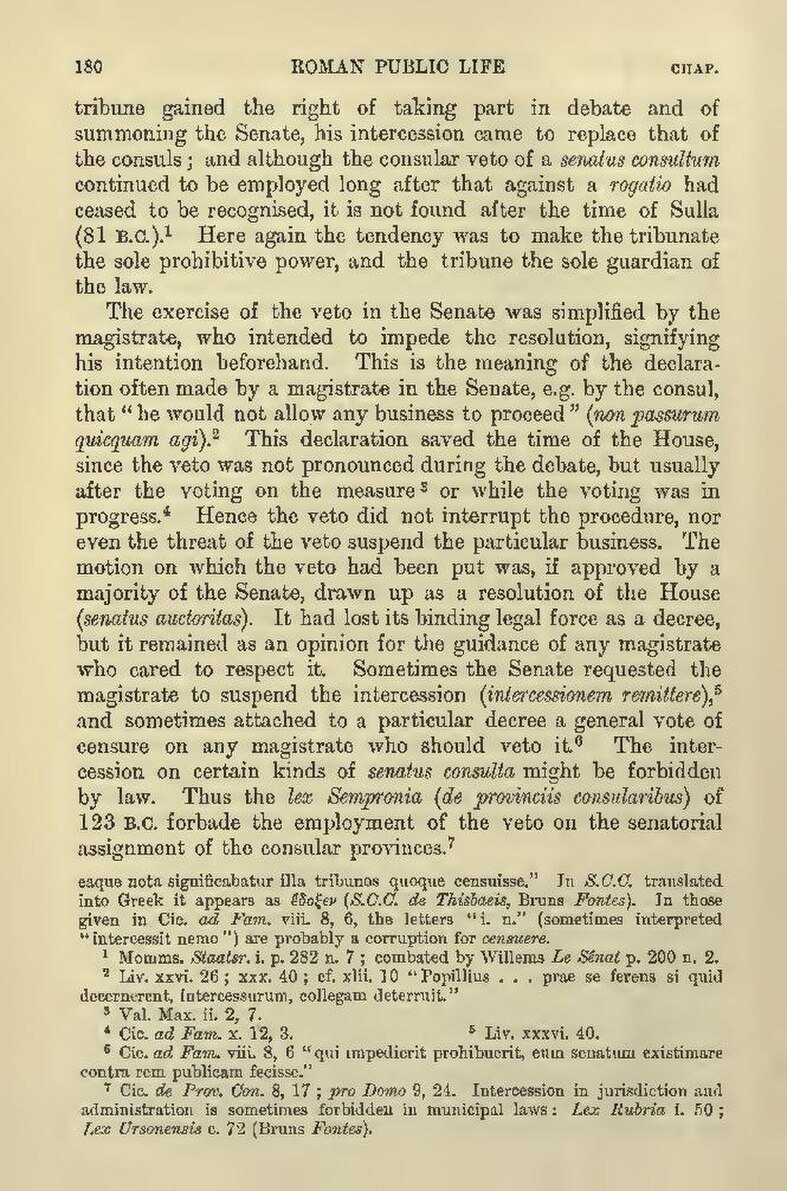tribune gained the right of taking part in debate and of summoning the Senate, his intercession came to replace that of the consuls; and although the consular veto of a senatus consultum continued to be employed long after that against a rogatio had ceased to be recognised, it is not found after the time of Sulla (81 B.C.).[1] Here again the tendency was to make the tribunate the sole prohibitive power, and the tribune the sole guardian of the law.
The exercise of the veto in the Senate was simplified by the magistrate, who intended to impede the resolution, signifying his intention beforehand. This is the meaning of the declaration often made by a magistrate in the Senate, e.g. by the consul, that "he would not allow any business to proceed" (non passurum quicquam agi).[2] This declaration saved the time of the House, since the veto was not pronounced during the debate, but usually after the voting on the measure[3] or while the voting was in progress.[4] Hence the veto did not interrupt the procedure, nor even the threat of the veto suspend the particular business. The motion on which the veto had been put was, if approved by a majority of the Senate, drawn up as a resolution of the House (senatus auctoritas). It had lost its binding legal force as a decree, but it remained as an opinion for the guidance of any magistrate who cared to respect it. Sometimes the Senate requested the magistrate to suspend the intercession (intercessionem remittere),[5] and sometimes attached to a particular decree a general vote of censure on any magistrate who should veto it.[6] The intercession on certain kinds of senatus consulta might be forbidden by law. Thus the lex Sempronia (de provinciis consularibus) of 123 B.C. forbade the employment of the veto on the senatorial assignment of the consular provinces.[7]
- [Footnote: eaque nota significabatur illa tribunos quoque censuisse." In S.C.C. translated
into Greek it appears as [Greek: edoxen] (S.C.C. de Thisbaeis, Bruns Fontes). In those given in Cic. ad Fam. viii. 8, 6, the letters "i. n." (sometimes interpreted "intercessit nemo") are probably a corruption for censuere.]
- ↑ Momms. Staatsr. i. p. 282 n. 7; combated by Willems Le Sénat p. 200 n. 2.
- ↑ Liv. xxvi. 26; xxx. 40; cf. xlii. 10 "Popillius . . . prae se ferens si quid decernerent, intercessurum, collegam deterruit."
- ↑ Val. Max. ii. 2, 7.
- ↑ Cic. ad Fam. x. 12, 3.
- ↑ Liv. xxxvi. 40.
- ↑ Cic. ad Fam. viii. 8, 6 "qui impedierit prohibuerit, eum senatum existimare contra rem publicam fecisse."
- ↑ Cic. de Prov. Con. 8, 17; pro Domo 9, 24. Intercession in jurisdiction and administration is sometimes forbidden in municipal laws: Lex Rubria i. 50; Lex Ursonensis c. 72 (Bruns Fontes).
